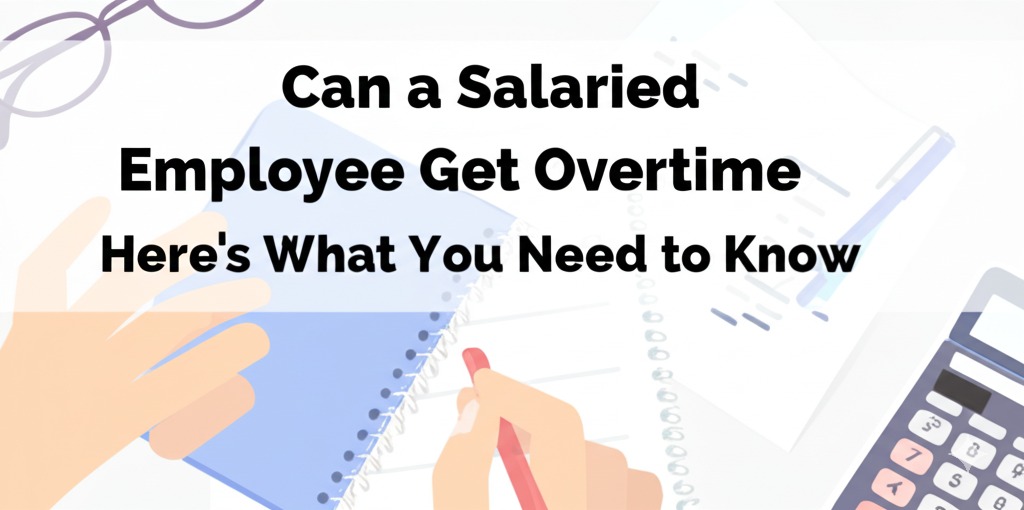
When people hear the term salaried employee, they often assume it means no overtime pay—just a fixed annual amount regardless of hours worked. But is that really the case? Can a salaried employee get overtime?
The short answer: Yes, in some cases. But the full answer depends on how you’re classified under labor laws, particularly under the Fair Labor Standards Act (FLSA) in the United States.
In this article, we’ll break down the rules, explain the difference between exempt and non-exempt employees, and help you understand your rights—or responsibilities—as a salaried worker or employer.
What Is a Salaried Employee?
Before diving into overtime rules, let’s clarify what it means to be a salaried employee.
A salaried employee earns a fixed amount of money each pay period, regardless of the number of hours worked. Unlike hourly workers, their compensation isn’t tied to time clocks. However, being salaried does not automatically mean you’re exempt from overtime pay.
Exempt vs. Non-Exempt Employees
The key factor in determining overtime eligibility isn’t whether someone is salaried—it’s whether they are exempt or non-exempt under the FLSA.
What Does “Exempt” Mean?
An exempt employee is not entitled to overtime pay under federal law. To qualify as exempt, an employee typically must meet the following criteria:
- Earn at least $684 per week (as of 2024)
- Be paid on a salary basis
- Perform certain types of job duties (such as executive, administrative, professional, or outside sales roles)
If all these conditions are met, the employee is classified as exempt and does not receive overtime pay, even if they work over 40 hours in a week.
What Is a Non-Exempt Employee?
A non-exempt employee is eligible for overtime pay. That means if they work more than 40 hours in a workweek, they must be paid at 1.5 times their regular hourly rate for the extra hours.
Surprisingly, some salaried employees can be non-exempt—and therefore entitled to overtime—if they don’t meet the FLSA exemption criteria.
Can a Salaried Employee Get Overtime?
Yes—If They’re Non-Exempt
If a salaried employee earns less than $684 per week or doesn’t meet the job duty requirements for exemption, they are considered non-exempt. That means:
- They must track hours worked
- They are entitled to overtime pay for hours over 40 per week
- Employers must comply with federal and state laws regarding compensation
No—If They’re Exempt
If a salaried employee meets all the exemption criteria, they are not eligible for overtime. These employees are typically in higher-level positions with more autonomy and responsibility.
Common Misconceptions About Overtime and Salaried Employees
Let’s clear up a few myths:
- “Salaried = No Overtime”
➤ False. Salaried employees can be non-exempt and eligible for overtime. - “All managers are exempt”
➤ Not always. A job title alone doesn’t determine exemption—job duties and salary level matter. - “Overtime laws don’t apply to professionals”
➤ Again, not true. If a professional doesn’t meet the salary or duties test, they may still be non-exempt.
How Employers Should Handle Overtime for Salaried Employees
If you’re an employer, it’s essential to:
- Properly classify employees based on FLSA standards
- Maintain accurate time records for non-exempt salaried staff
- Pay required overtime wages to eligible workers
Misclassification can lead to costly lawsuits, fines, and back pay.
State Laws May Vary
It’s worth noting that state labor laws can differ from federal rules—some states have stricter overtime thresholds or salary tests. For example:
- California has its own set of overtime and exemption criteria
- New York sets higher minimum salary thresholds for exempt employees
Always check your local labor laws or consult with an HR expert or employment attorney to ensure compliance.
How to Know If You’re Eligible for Overtime
If you’re not sure where you stand, ask yourself:
- Do I earn less than $684 per week?
- Do my job duties primarily involve routine, manual, or support tasks?
- Do I work more than 40 hours a week without extra pay?
If you answered “yes” to any of these, you might be a non-exempt employee entitled to overtime pay.
Conclusion: Know Your Rights and Responsibilities
So, can a salaried employee get overtime? Yes—if they’re classified as non-exempt under the FLSA or state laws. The distinction between exempt and non-exempt is crucial, and it’s based on more than just your pay structure.
Whether you’re an employee trying to understand your rights or an employer trying to stay compliant, it’s vital to:
- Know the exemption tests
- Stay updated on current FLSA regulations
- Consult legal or HR professionals when in doubt
👉 Need help figuring out your classification or updating your company policies? Reach out to a qualified HR consultant or labor attorney today.

Andre Cuevas provides career insights, job search strategies, and professional advice to help individuals navigate the job market and achieve their career goals.





